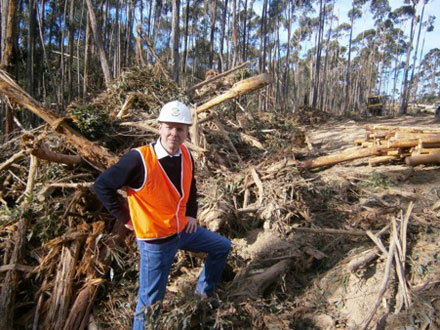The Australian Forest Products Association (AFPA) says the Federal Government has bowed to pressure from anti-forestry groups by removing the eligibility of native forest biomass from the Renewable Energy Target which it says is at odds with the international scientific consensus. Source: Timberbiz
Electricity generated by burning native forest wood waste will no longer be allowed to be classified as renewable energy under a regulatory change adopted by the Federal Government.
The decision, which Labor had promised to consider after it was recommended by a Senate committee in September, reverses a 2015 Abbott government move which allowed burning native forest timber to be counted alongside solar and wind energy towards the national renewable energy target.
The right to burn wood left over from logging to create renewable energy certificates, which provide a subsidy for clean energy generation, was not often used, but conservation groups said it could be an incentive to keep felling native forests.
AFPA Chief Executive Officer Ross Hampton said the decision ignored the advice from the United Nations’ Intergovernmental Panel on Climate Change (IPCC) that sustainably sourced forest biomass is a renewable energy feedstock.
“Bioenergy produced from sustainable biomass wood residues is carbon neutral and recognised internationally as a renewable energy resource,” Mr Hampton said.
“Australia should not close the door to a dispatchable renewable energy source that is widely used around the world at a time when we need more renewable energy sources.”
The significant potential for the forestry and forest products industry to contribute to climate change mitigation including through renewable bioenergy, is acknowledged in the 4th assessment report of the IPCC, which states:
“A sustainable forest management strategy aimed at maintaining or increasing forest carbon stocks, while producing an annual sustained yield of timber, fibre or energy from the forest, will generate the largest sustained mitigation benefit.”
“The fact is that over the past 20 years there have been no projects under the RET that have used native forest residues for electricity anywhere in Australia. That is because our native forests are primarily managed for high-value hardwood timber products such as floorboards, decking, furniture and joinery. The industry then tries to find the highest value uses for the residues,” Mr Hampton said.
“However, Australia’s wood and paper product industries routinely use mill residues for heat energy for a wide variety of applications, including drying, preheating, and process heating. In doing so, they are using a renewable energy source instead of fossil fuels, and we welcome that the Government has recognised this and that mill residues will continue to be an eligible feedstock in the RET.”
Mr Hampton said Australia’s forest industries would continue to work with the Federal Government on supporting innovation and R&D to unlock even higher value uses for renewable wood residues and build the circular economy.
“Increasingly, the sector is looking for higher value uses for residues, such as engineered wood products, biomaterials and biochemicals to displace plastics and other fossil fuel-based chemicals. It is important that the Federal Government continues to support rather than discourage investment in all our sustainable forest industries,” Mr Hampton said.
Opposition Forestry Minister Jonno Duniam said the decision was the latest in a string of anti-business attacks by the Federal Government which had promised at the Federal election just six months ago to stand up for the forestry industry, and its thousands of workers.
Senator Duniam said there had been no projects under the RET over the past 20 years that have used native forest residues for electricity anywhere in Australia.
“It’s in Labor’s DNA to attack this industry, as they are currently doing in Victoria and Western Australia at a State level,” he said.
“And now, it looks like they may have promised the Greens that they would take this action on forest biomass as part of their deal to get their disastrous energy legislation through the Parliament.
“Australia’s forestry sector deserves a way better approach than the one they are receiving from the Albanese Government.”






